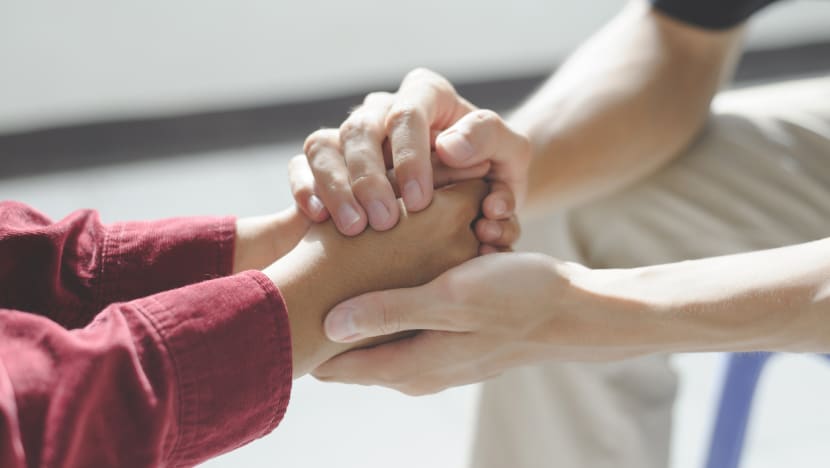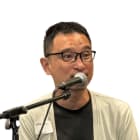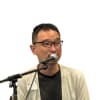Commentary: I'm dying. It’s okay if friends don’t know how to be there for me – just be there
Living with a fatal motor neuron disease that has taken away his physical function, Yeo Whee Jim reflects on how old friends and new have helped share the burden of a terrible illness.


This audio is generated by an AI tool.
SINGAPORE: How does one announce the diagnosis of a terminal illness?
At 50, instead of fleshing out my retirement plans or planning grand adventures with my daughter, I am grappling with an incurable disease. Amyotrophic Lateral Sclerosis (ALS) has already robbed me of my physical autonomy and the ability to live independently - and left me with a countdown clock of two to five years.
In the wake of my diagnosis came the whirlwind of medical appointments and administrative matters, such as my will and insurance. Family and the handful of friends I leaned on urgently to help with the pressing matters were the first to know.
As for everyone else, I was completely clueless about how to break such life-altering news. Do I post on social media, ask friends to spread the word, or allow the news to organically circulate through personal networks?
It ended up beyond my control. News about my diagnosis rippled through my social circle and, like a game of broken telephone, the story morphed and expanded, taking on a life of its own.
SHARING THE WEIGHT OF ILLNESS
Understandably, some people might prefer more privacy. Who wants to be the centre of attraction under such morbid circumstances?
Perhaps they refuse visitors, anxious about being remembered at their frailest, not at their best. Perhaps they harbour hopes for a miracle that would fully restore their bodies. Maybe they just need more time to be alone.
Some of my friends later told me that they were overwhelmed by the gravity of my condition. This disease is aggressive, its trajectory chilling. They were unsure if I was ready to receive visitors, and wanted to give me time and space out of concern for my well-being.
At the same time, I took a calculated risk to reach out to others with whom I had not regularly kept in touch. Would more casual friends be prepared to share the weight of a debilitating illness with me?
Looking back, I realised that it might have hurt some friends to find out they were not among the first to know. But I knew true friends would somehow understand.
MANY WAYS OF BEING A FRIEND
“But I don’t know how to be there for them, or how to comfort them,” I hear you think out loud. Well, there’s no one way of being a supportive friend.
Those who offered practical help - driving and accompanying me to countless medical appointments, running errands, getting my favourite food like bak chor mee - eased my burden immensely.
Simple acts of scratching an itch, adjusting my sitting position, or reaching for a glass of water have transformed from mundane to monumental - now that I require assistance for all these actions as my muscles weaken and waste away. Friends who showed up helped give my caregiver some well-deserved respite.
Other friends kept a close watch on my emotional and spiritual well-being: Including me in social and church activities, taking me out for a walk in the park, or even taking me on overseas trips despite the added logistics and planning such as getting me travel insurance for pre-existing illnesses.
Friends from afar checked in on me regularly through messaging platforms. Far beyond mere words of comfort, they helped me cling onto some semblance of normalcy and saved me from wallowing in solitary self-pity, or worse, slipping into depression.
Equally important were friends who listened without trying to "fix" things that could not be fixed in the first place. They engaged in honest conversations without engaging in verbal and spiritual platitudes.
I am grateful for those who struck the delicate balance of showering me with care and concern without overwhelming me with constant attention, those who could skilfully respond to my utterly confusing, contradictory need for both support and space.
The outpouring of love and concern more than made up for the “morbid curiosity” of some friends and emotional exhaustion from having to deal with the same questions from different friends.
THE GIFT OF GENEROSITY
ALS has completely rewritten my understanding of generosity. I had viewed generosity primarily through the lens of material giving or even conspicuous grand gestures.
Now, I also see generosity in the friend who quietly offers to see to my affairs after my demise; in the friend who includes me in his family outings; in the friend who squeezes in a quick visit in between his busy work schedule; in my medical social worker - whom I now treat as a friend - who despite being on vacation leave tries to help me close the emotional gap with my loved ones.
They set aside the emotional capacity, time and resources to support a friend in need - to be present, to hold uncomfortable conversations about the transient nature of life, and to still find joy in these shared moments.
It’s about what we are willing to share of ourselves, at a time when everyone is spread thin with their own needs. I see how much my friends have done for me, and how they expect nothing in return.
I now have a newfound appreciation for the saying, "To live is to give, and to give is to live." Despite my physical limitations, I have discovered that I too, can still give - through my words, my presence and my experiences. And in giving, I find a renewed sense of purpose.
My condition has opened doors to new friendships and renewed old ones, offering opportunities for new adventures, discoveries and growth even as my physical world dramatically shrinks.
PRIVILEGE IN CRISIS
For me, this is how you can be a friend to someone in their final stages of life: Use your ability to be present, your capacity for vulnerability, and your gift of time to foster deeper and more meaningful connections. Embrace even the tiny acts of generosity well within your capabilities.
For friends who have not had the capacity to reach out, I know you might be going through a rough time or grappling with your own challenges. I hope you will overcome them and look forward to catching up with you soon.
In the end, what truly matters may simply be about how deeply we allow ourselves to connect with one another. I am privileged in having strong social networks and the ability to afford quality healthcare and caregiving, allowing me to go beyond basic survival mode to live a more fulfilling life while I still can.
May we all have the privilege to discover the profound truth that to live is indeed to give, and to give is to truly live.
Yeo Whee Jim has published his first collection of poetry, Itinerary. Net proceeds from the book sales have gone to the Motor Neurone Disease Association of Singapore.




















